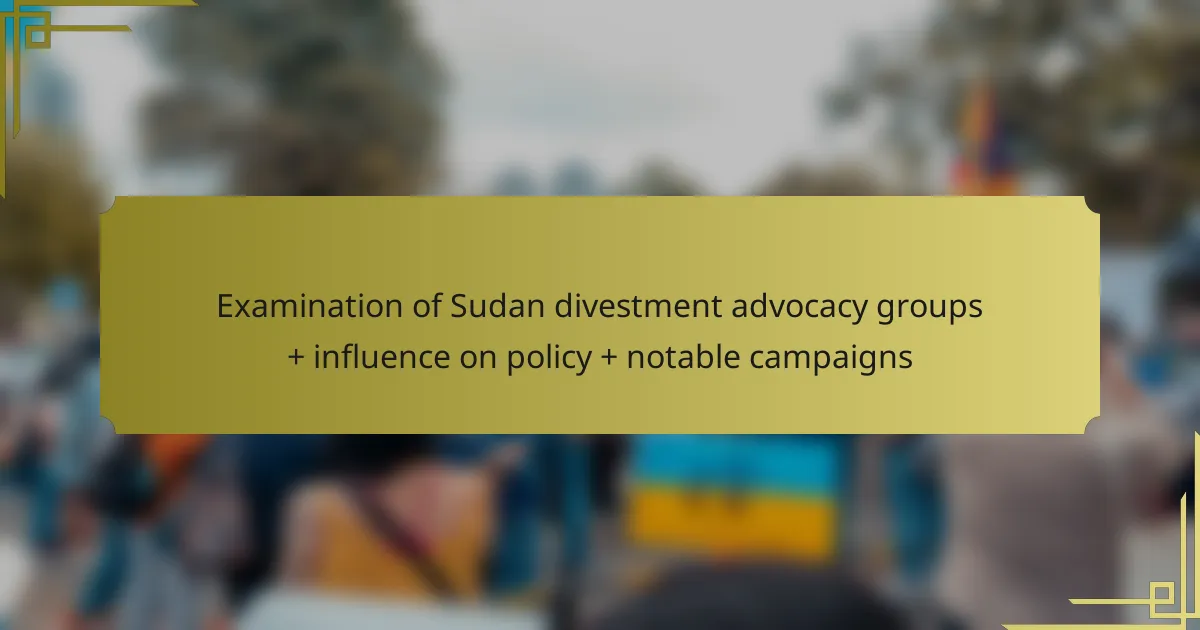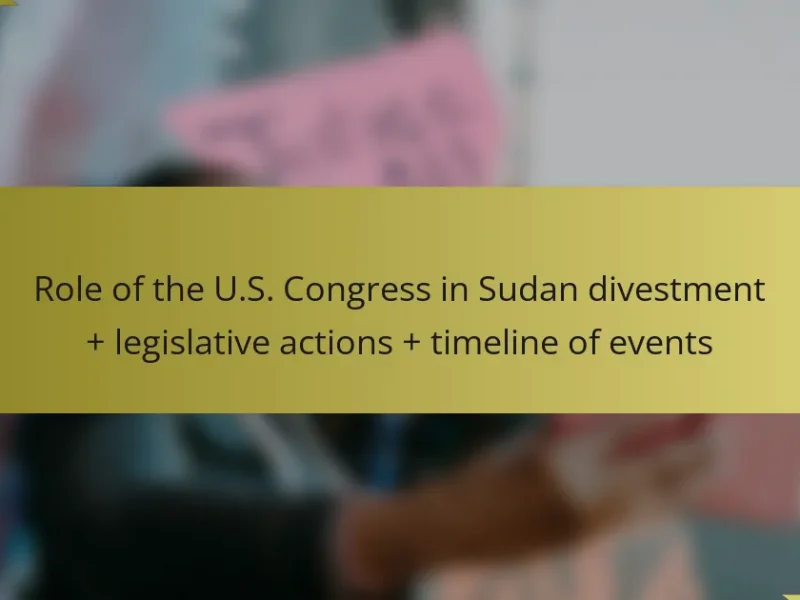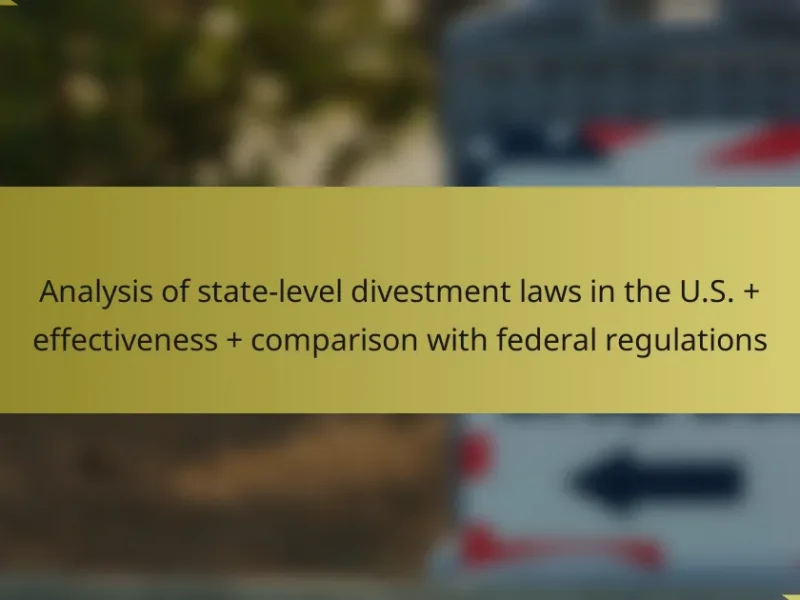Sudan divestment advocacy groups are organizations focused on promoting the withdrawal of investments from Sudan to address human rights violations by the Sudanese government. These groups, including the Sudan Divestment Task Force and various university coalitions, leverage campaigns, public awareness, and lobbying efforts to influence policymakers and drive significant divestment from Sudanese companies. Key campaigns, such as the Sudan Divestment Task Force initiative and “Divest for Darfur,” have successfully mobilized support from states and institutions to enact divestment laws. The article will examine the influence of these advocacy groups on policy changes and highlight notable campaigns that have raised awareness of human rights abuses in Sudan.
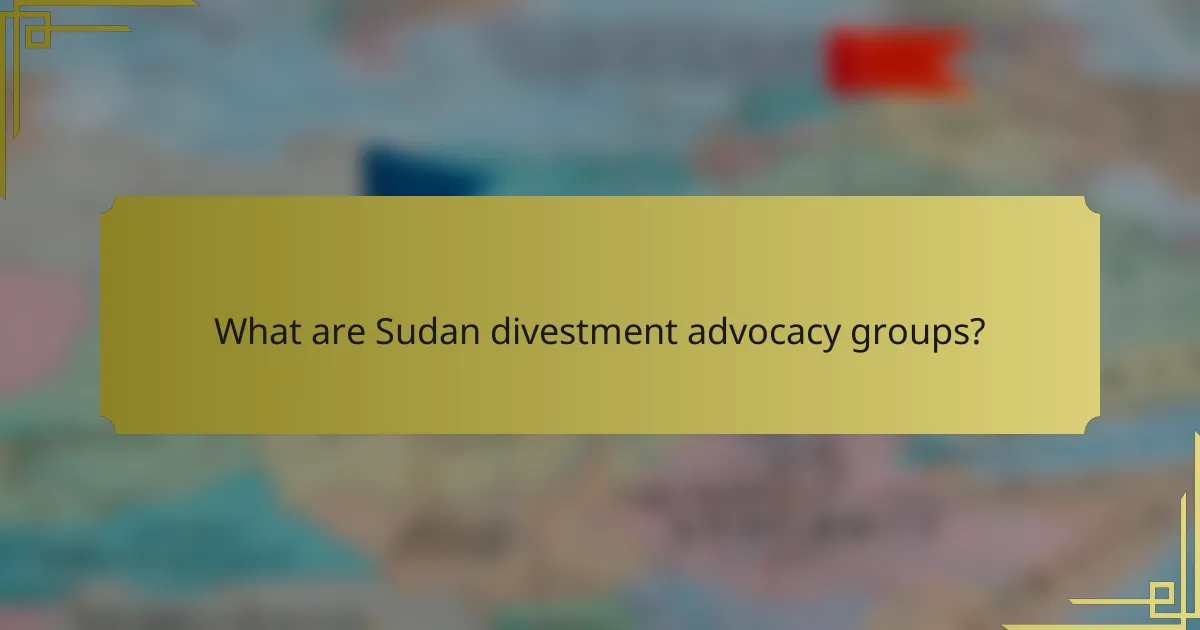
What are Sudan divestment advocacy groups?
Sudan divestment advocacy groups are organizations that promote the withdrawal of investments from Sudan. These groups aim to pressure the Sudanese government to change its policies, particularly regarding human rights violations. They often focus on issues like the Darfur conflict and the Sudanese government’s actions against its citizens. Notable organizations include the Sudan Divestment Task Force and various university coalitions. These groups utilize campaigns, public awareness, and lobbying efforts to influence policymakers. Their efforts have led to significant public and institutional divestment from Sudanese companies. This divestment is intended to hold the Sudanese government accountable for its actions.
How do these advocacy groups operate?
Advocacy groups operate by mobilizing resources to influence public policy and raise awareness about specific issues. They engage in research to provide evidence-based arguments supporting their causes. These organizations often form coalitions to strengthen their impact and reach. They utilize various communication channels, including social media, to disseminate information and rally supporters. Advocacy groups also organize events, such as rallies and campaigns, to draw public attention and encourage participation. They may engage in lobbying efforts to directly influence lawmakers and decision-makers. Additionally, these groups often produce reports and policy briefs to inform stakeholders about their positions. Their operations are guided by strategic planning to maximize effectiveness and achieve specific goals.
What strategies do they employ to influence divestment?
Advocacy groups employ several strategies to influence divestment from Sudan. They raise public awareness through campaigns that highlight human rights abuses. These campaigns often use social media to reach a wider audience. They also engage in grassroots organizing to mobilize community support. Lobbying efforts target policymakers to encourage legislative action. Additionally, they build coalitions with other organizations to amplify their message. Research indicates that these strategies can lead to significant financial pressure on companies operating in Sudan. For example, the divestment movement gained momentum in the early 2000s, resulting in major institutions withdrawing investments.
Who are the key players in these advocacy groups?
The key players in Sudan divestment advocacy groups include organizations such as Save Darfur Coalition, Sudan Divestment Task Force, and the Enough Project. These groups focus on raising awareness and promoting divestment from companies operating in Sudan. Notable individuals involved include John Prendergast, co-founder of the Enough Project, and actor George Clooney, who has been a vocal advocate. Additionally, various grassroots organizations and student groups actively participate in the divestment movement. Their collective efforts have influenced policy decisions and public perception regarding Sudan’s human rights issues.
What motivates the formation of Sudan divestment advocacy groups?
Sudan divestment advocacy groups are motivated by the desire to promote human rights and social justice. These groups aim to raise awareness about the humanitarian crises in Sudan, particularly in regions affected by conflict. They seek to pressure companies and governments to withdraw investments that support oppressive regimes. The advocacy is often fueled by reports of violence, genocide, and ethnic cleansing in Sudan. For example, the Darfur conflict has prompted widespread activism and calls for divestment. Additionally, these groups leverage public sentiment and mobilize grassroots support to influence policy changes. Their efforts are often aimed at creating economic pressure that can lead to improved conditions for affected populations.
What historical events have led to the emergence of these groups?
The emergence of Sudan divestment advocacy groups is primarily linked to the Second Sudanese Civil War, which began in 1983. This conflict resulted in significant human rights abuses and humanitarian crises. In the early 2000s, reports of genocide in Darfur intensified global awareness and activism. The U.S. government’s response included the Sudan Peace Act in 2002, which aimed to address the situation. Grassroots movements began organizing campaigns for divestment from companies operating in Sudan. Notable campaigns included the “Sudan Divestment Task Force,” which formed in 2005. These efforts aimed to pressure the Sudanese government by targeting financial investments. The combination of humanitarian concerns and policy initiatives catalyzed the formation of these advocacy groups.
How do ethical considerations shape their mission?
Ethical considerations shape the mission of Sudan divestment advocacy groups by prioritizing human rights and social justice. These groups often focus on the impact of conflict and oppression in Sudan. Their mission is driven by a commitment to promote ethical investment practices. They encourage institutions to withdraw financial support from entities contributing to human rights abuses. This approach aims to pressure the Sudanese government to change its policies. Advocacy efforts highlight the moral responsibility of investors. By raising awareness, they foster public support for divestment initiatives. This ethical framework influences their strategies and campaigns significantly.
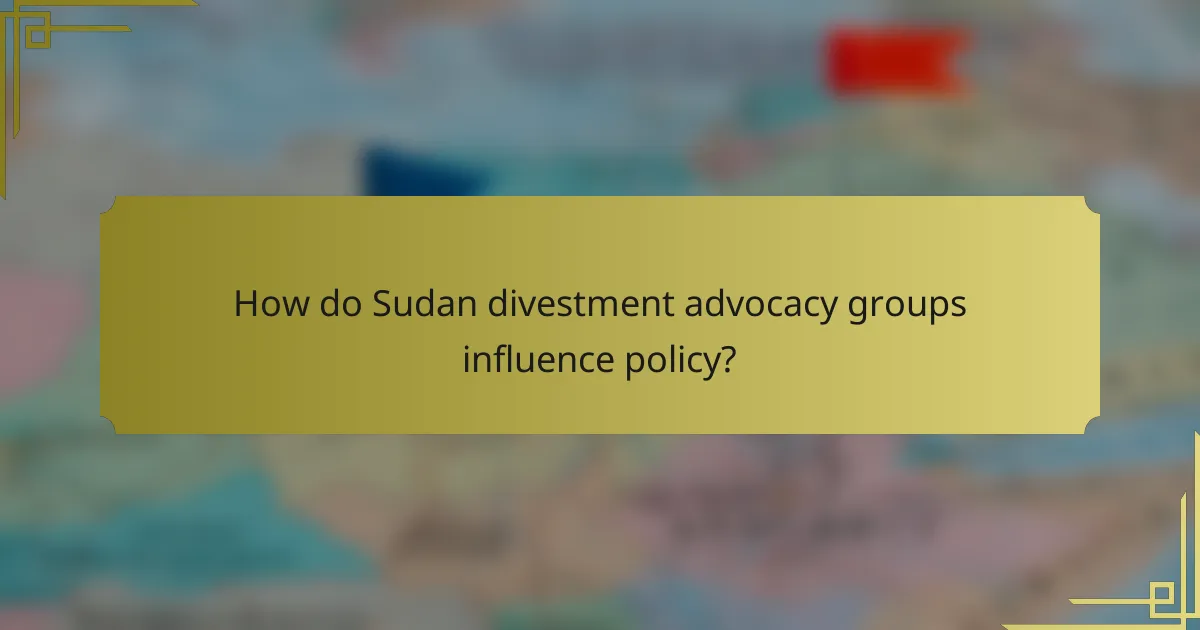
How do Sudan divestment advocacy groups influence policy?
Sudan divestment advocacy groups influence policy through strategic campaigns and public awareness efforts. They mobilize grassroots support to pressure governments and institutions to divest from companies operating in Sudan. These groups utilize research and data to highlight human rights abuses linked to investments in the region. They also engage in lobbying activities to persuade lawmakers to adopt divestment legislation. Notably, the Sudan Divestment Task Force has successfully encouraged states and universities to divest, impacting financial flows to the Sudanese government. Their campaigns often include coordinated actions, such as protests and petitions, amplifying their message. This combination of advocacy, public engagement, and legislative pressure creates significant policy shifts.
What mechanisms do they use to affect policy changes?
Sudan divestment advocacy groups use multiple mechanisms to affect policy changes. They engage in grassroots mobilization to raise public awareness about the issues in Sudan. This mobilization often includes organizing protests, rallies, and educational campaigns. They also utilize lobbying efforts to influence lawmakers directly. These groups present research and data to support their positions. Collaborations with other organizations amplify their reach and impact. Media campaigns help to highlight their causes, drawing attention from a wider audience. Additionally, they leverage social media platforms to mobilize support and disseminate information quickly. These combined efforts have led to significant policy changes, such as divestment from companies operating in Sudan.
How do advocacy groups engage with policymakers?
Advocacy groups engage with policymakers through direct lobbying, grassroots mobilization, and public awareness campaigns. They often schedule meetings with legislators to discuss specific issues. They provide research and data to support their positions. Advocacy groups also organize rallies and events to demonstrate public support. Additionally, they utilize social media to amplify their messages. Many groups create coalitions to strengthen their influence. They often draft legislation or policy proposals for lawmakers. Evidence shows that advocacy efforts can lead to significant policy changes, as seen in various historical campaigns.
What role does public awareness play in their influence?
Public awareness significantly enhances the influence of Sudan divestment advocacy groups. Increased awareness mobilizes public opinion and drives collective action. Advocacy groups utilize campaigns to inform the public about the humanitarian crisis in Sudan. This information encourages individuals to support divestment initiatives. Studies show that public pressure can lead to policy changes. For example, the Sudan divestment movement resulted in several states and institutions divesting from companies operating in Sudan. This collective action demonstrates how awareness translates into tangible political influence. Public awareness acts as a catalyst for change in policy regarding Sudan’s human rights issues.
What challenges do these groups face in influencing policy?
Sudan divestment advocacy groups face several challenges in influencing policy. Limited funding restricts their ability to mobilize resources effectively. Competing interests from powerful stakeholders often overshadow their advocacy efforts. Additionally, a lack of access to decision-makers hampers their capacity to present their case. The complexity of the political landscape in Sudan further complicates their efforts. Inconsistent public awareness about the issues reduces pressure on policymakers. Furthermore, legal barriers can obstruct their initiatives for divestment. These challenges collectively hinder their effectiveness in driving meaningful policy change.
How do political climates impact their effectiveness?
Political climates significantly impact the effectiveness of advocacy groups. A supportive political environment can enhance their visibility and influence. For instance, when political leaders align with the group’s goals, it can lead to favorable legislation. Conversely, hostile political climates can hinder advocacy efforts. In such cases, groups may face increased opposition and limited access to decision-makers. Historical examples include the Sudan divestment movement, which gained traction during heightened awareness of human rights abuses. The political support from various states facilitated successful divestment policies. Thus, the political context shapes both the opportunities and challenges for advocacy groups.
What resistance do they encounter from stakeholders?
Sudan divestment advocacy groups encounter resistance from various stakeholders. Key stakeholders include government officials, corporations, and financial institutions. Government officials may resist due to political ties with Sudan or economic interests. Corporations may face backlash from shareholders concerned about financial implications. Financial institutions often prioritize profit over ethical considerations, leading to reluctance in supporting divestment. Additionally, some stakeholders may question the effectiveness of divestment as a strategy. This resistance can hinder the advocacy groups’ efforts to influence policy and implement notable campaigns.
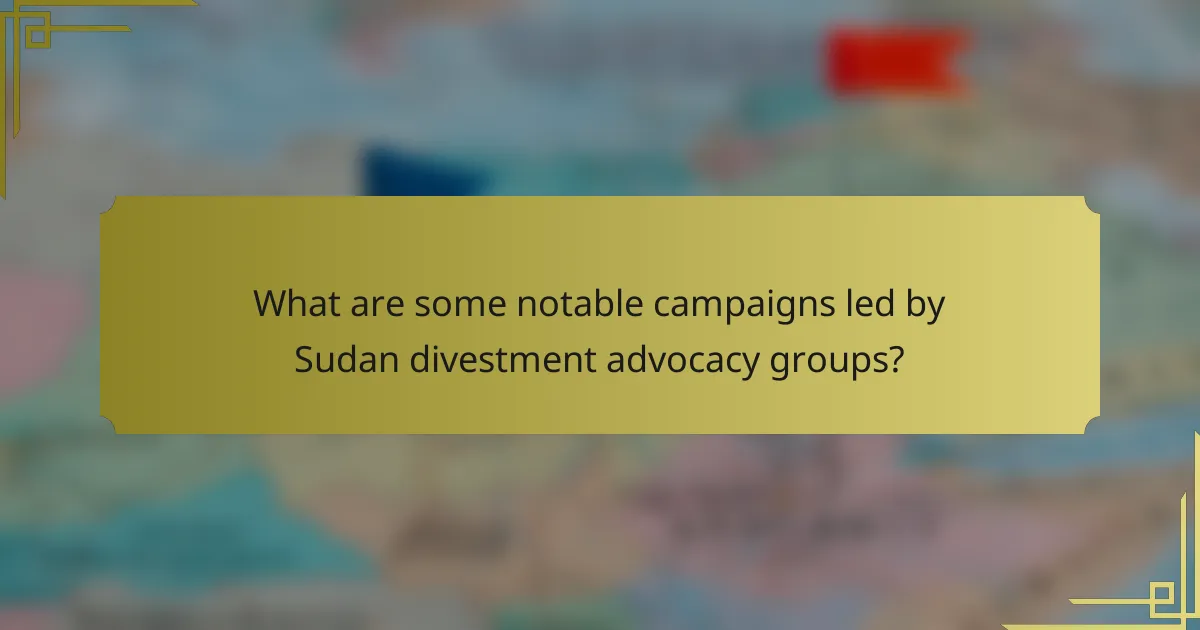
What are some notable campaigns led by Sudan divestment advocacy groups?
Notable campaigns led by Sudan divestment advocacy groups include the Sudan Divestment Task Force (SDTF) campaign. This initiative focused on urging investors to withdraw funds from companies operating in Sudan. The campaign highlighted the human rights abuses in Darfur as a primary reason for divestment. Another significant effort was the “Divest for Darfur” campaign, which mobilized universities and pension funds to divest from Sudanese interests. These campaigns successfully influenced state and institutional policies towards divestment. As a result, several states in the U.S. enacted divestment laws targeting companies involved in Sudan. This collective action raised awareness and pressured the Sudanese government regarding human rights violations.
What key campaigns have made a significant impact?
The key campaigns that have made a significant impact in Sudan divestment advocacy include the Sudan Divestment Task Force and the Save Darfur Coalition. The Sudan Divestment Task Force was established in 2005 to encourage investors to withdraw from companies supporting the Sudanese government. This campaign led to over $3 billion in divestments from companies involved in the Sudanese oil and military sectors. The Save Darfur Coalition mobilized grassroots support and raised awareness about the humanitarian crisis in Darfur. This campaign influenced U.S. policy, leading to the implementation of sanctions against Sudanese officials. The combined efforts of these campaigns significantly shaped public perception and legislative action regarding Sudan’s human rights violations.
What were the objectives of these campaigns?
The objectives of these campaigns were to raise awareness about the humanitarian crisis in Sudan. They aimed to pressure companies to divest from Sudanese investments. Advocacy groups sought to influence policymakers to impose sanctions on the Sudanese government. The campaigns also intended to mobilize public support for Sudanese rights. They aimed to foster solidarity with affected communities in Sudan. Additionally, they sought to promote ethical investment practices globally. Through these objectives, the campaigns aimed to bring about tangible changes in Sudan’s political landscape.
How successful were these campaigns in achieving their goals?
The campaigns were largely successful in achieving their goals. Advocacy groups effectively raised awareness about the humanitarian crisis in Sudan. They mobilized public opinion and influenced policymakers to consider divestment strategies. For instance, the Sudan Divestment Task Force reported that numerous universities and pension funds adopted divestment policies. This action pressured companies to withdraw investments from Sudan. The campaigns led to legislative discussions on sanctions against the Sudanese government. Overall, the collective efforts resulted in significant financial and political pressure on Sudan.
What lessons can be learned from these notable campaigns?
Notable campaigns in Sudan divestment advocacy demonstrate the importance of strategic messaging. Clear communication of goals engages stakeholders effectively. Building coalitions with diverse groups amplifies advocacy efforts. Grassroots mobilization increases public awareness and support. Data-driven approaches enhance credibility and influence policy decisions. Timely responses to current events maintain relevance in advocacy. Leveraging media coverage can significantly expand reach and impact. These lessons highlight effective strategies for driving policy change through organized campaigns.
How can future campaigns improve based on past experiences?
Future campaigns can improve by analyzing past campaign outcomes. Evaluating successes and failures provides critical insights. For instance, understanding which messaging resonated with the audience can refine communication strategies. Data from previous campaigns shows that targeted outreach significantly increases engagement rates. Additionally, assessing the timing of past efforts helps in scheduling future initiatives for maximum impact. Feedback from participants and stakeholders is invaluable for identifying areas of improvement. Historical examples demonstrate that iterative adjustments based on past experiences lead to more effective advocacy. Ultimately, leveraging lessons learned enhances the overall effectiveness of future campaigns.
What best practices have emerged from successful campaigns?
Successful campaigns in Sudan divestment advocacy have demonstrated several best practices. First, building coalitions with diverse stakeholders enhances credibility and reach. For example, partnerships between NGOs, universities, and businesses have amplified messages. Second, leveraging data and research strengthens arguments for divestment. Reports detailing the humanitarian impact of investments have swayed public opinion and policymakers. Third, utilizing social media effectively mobilizes grassroots support. Campaigns that engaged audiences through platforms like Twitter and Facebook saw increased participation. Fourth, consistent messaging across all channels ensures clarity and focus. Successful campaigns maintained a unified narrative to avoid confusion. Finally, targeting specific legislative goals led to tangible policy changes. For instance, campaigns that aimed directly at state-level divestment laws achieved measurable success. These practices are supported by case studies of notable campaigns that led to significant shifts in policy regarding Sudan.
What practical steps can individuals take to support Sudan divestment advocacy groups?
Individuals can support Sudan divestment advocacy groups by engaging in several practical actions. First, they can educate themselves and others about the issues surrounding divestment from Sudan. This knowledge helps raise awareness and mobilizes community support. Second, individuals can participate in local or online campaigns organized by advocacy groups. This involvement amplifies the message and increases visibility. Third, they can contact their elected officials to express support for divestment policies. Legislators often respond to constituents’ concerns. Fourth, individuals can donate to advocacy organizations working on Sudan divestment. Financial contributions help sustain these groups’ efforts. Fifth, they can share information on social media platforms to reach a broader audience. This can influence public opinion and encourage further action. Lastly, attending events or rallies organized by these groups can demonstrate solidarity and commitment to the cause. These steps collectively contribute to the effectiveness of Sudan divestment advocacy efforts.
Sudan divestment advocacy groups are organizations focused on promoting the withdrawal of investments from Sudan to pressure the government for policy changes, particularly regarding human rights violations. This article examines the operations, strategies, and historical context of these advocacy groups, highlighting their influence on policy and detailing notable campaigns such as the Sudan Divestment Task Force and the Save Darfur Coalition. Key players, ethical considerations, and the challenges faced by these groups in mobilizing public awareness and engaging with policymakers are also discussed, providing a comprehensive overview of their impact on Sudan’s human rights issues.
